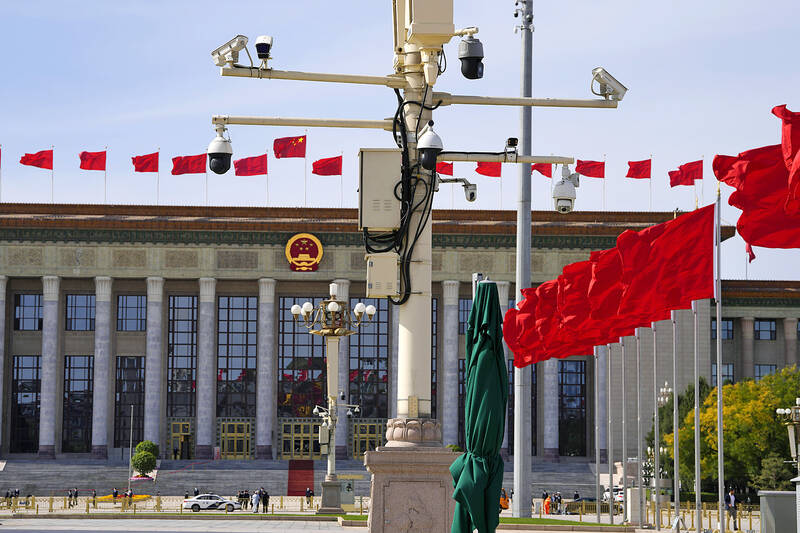China’s spy agency yesterday said it detained the head of a foreign consultancy for spying for the British Secret Intelligence Service, commonly known as MI6.
The Chinese Ministry of State Security said in a WeChat post that MI6 had since 2015 been cooperating with a foreign national with the surname Huang (黃) to establish an “intelligence cooperation relationship.”
Huang, who headed a foreign consulting agency, “entered China several times under instructions to use their public profile as a cover to collect China-related intelligence for Britain ... and seek other personnel whom MI6 could turn,” it said.

Photo: AP
Huang, who is a citizen of a third nation, allegedly passed 17 pieces of intelligence, including confidential state secrets, to MI6 before he was identified, it said.
The ministry also claimed he had received “professional intelligence training” in the UK, and had used “specialist spying equipment” to send communications.
An investigation had “promptly discovered criminal evidence that Huang was engaged in espionage activities, and took criminal coercive measures in accordance with the law,” it said.
The statement did not provide further details of Huang’s identity or employer, or describe their current condition or whereabouts.
The British government has yet to comment on the allegations, but they follow a deterioration of relations between the sides sparked in part by British opposition to Chinese investments in the UK, especially in the power and communications industries where the Chinese Communist Party exercises strong influence.
The Chinese Ministry of Foreign Affairs declined to provide further comment when asked about the case at a regular news briefing.
China and the UK have traded barbs in the past few months over allegations of perceived espionage and its resulting effect on national security.
London has warned that Chinese spies are increasingly targeting officials, allegations that Beijing has denied.
A researcher at the British parliament was arrested last year under the Official Secrets Act and subsequently denied spying for Beijing.
China, which has a broad definition of state secrets, has publicized several other alleged spying cases in the past few months.
In May last year, authorities sentenced 78-year-old American John Shing-wan Leung (梁成運) to life in prison for espionage, although Beijing has not provided substantial details of his case.
In October last year, the Chinese Ministry of State Security published the story of another alleged spy, surnamed Hou (侯), who was accused of sending several secret and classified documents to the US.
China last year also raided a string of big-name consulting, research and due diligence firms.

ACTION PLAN: Taiwan would expand procurement from the US and encourage more companies to invest in the US to deepen bilateral cooperation, Lai said The government would not impose reciprocal tariffs in retaliation against US levies, President William Lai (賴清德) said yesterday, as he announced five strategies to address the issue, including pledging to increase Taiwanese companies’ investments in the US. Lai has in the past few days met with administrative and national security officials, as well as representatives from various industries, to explore countermeasures after US President Donald Trump on Wednesday last week announced a 32 percent duty on Taiwanese imports. In a video released yesterday evening, Lai said that Taiwan would not retaliate against the US with higher tariffs and Taiwanese companies’ commitments to

Intelligence agents have recorded 510,000 instances of “controversial information” being spread online by the Chinese Communist Party (CCP) so far this year, the National Security Bureau (NSB) said in a report yesterday, as it warned of artificial intelligence (AI) being employed to generate destabilizing misinformation. The bureau submitted a written report to the Legislative Yuan in preparation for National Security Bureau Director-General Tsai Ming-yen’s (蔡明彥) appearance before the Foreign Affairs and National Defense Committee today. The CCP has been using cognitive warfare to divide Taiwanese society by commenting on controversial issues such as Taiwan Semiconductor Manufacturing Co’s (TSMC, 台積電) investments in the

‘SPECIAL CHANNEL’: Taipei’s most important tasks are to stabilize industries affected by Trump’s trade tariffs and keep negotiations with Washington open, a source said National Security Council Secretary-General Joseph Wu (吳釗燮) arrived in the US for talks with US President Donald Trump’s administration, a source familiar with the matter said on Friday. Wu was leading a delegation for a meeting known as the “special channel,” the Financial Times reported earlier. It marked Trump’s first use of the channel since returning to the White House on Jan. 20. Citing a source familiar with the matter, the Financial Times reported that Minister of Foreign Affairs Lin Chia-lung (林佳龍) was also a part of the delegation. The visit came days after China concluded war games around Taiwan and amid Trump’s

HELPING HAND: The steering committee of the National Stabilization Fund is expected to hold a meeting to discuss how and when to utilize the fund to help buffer the sell-off The TAIEX plunged 2,065.87 points, or 9.7 percent, to close at 19,232.35 yesterday, the highest single-day percentage loss on record, as investors braced for US President Donald Trump’s tariffs after an extended holiday weekend. Amid the pessimistic atmosphere, 945 listed companies led by large-cap stocks — including Taiwan Semiconductor Manufacturing Co (TSMC, 台積電), Hon Hai Precision Industry Co (鴻海精密) and Largan Precision Co (大立光) — fell by the daily maximum of 10 percent at the close, Taiwan Stock Exchange data showed. The number of listed companies ending limit-down set a new record, the exchange said. The TAIEX plunged by daily maxiumu in just